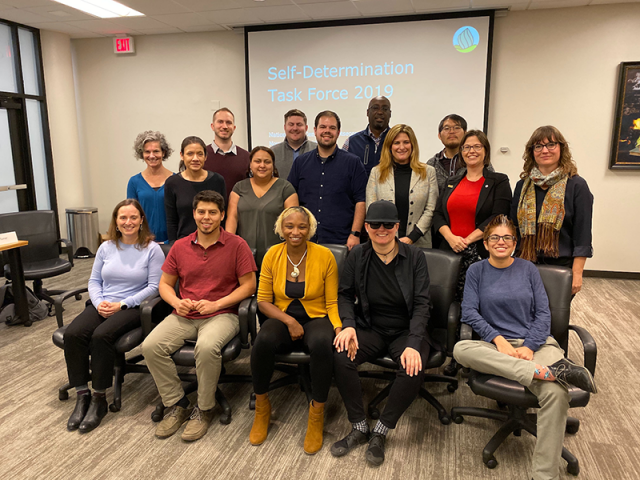NDC’s Self-Determination Task Force brings together experts and professionals from diverse communities and fields annually to discuss how to instill and increase self-determination for deaf students.
This year marked the third annual meeting where members offered additional insights on new practices while building on strategies discussed in previous years; ultimately leading to the planning and development of new resources and actions to take for the following year.
What is self-determination?
Self-Determination is the sum of an individual’s attitudes, characteristics, skills, knowledge, beliefs and perspectives that leads them to define their own goals, act autonomously, and self-regulate (1, 2, 3).
Self-determination among deaf high school students is linked to greater autonomy, living independently, positive self-beliefs and positive adult outcomes, including postsecondary enrollment, higher wages and career advancement (4, 5, 6).
For example, a scenario in Deafverse, the interactive game for deaf students, the player meets a deaf college student named Bella. Bella explains that there are many accommodation options and that these options may change depending on the setting. However, it is important that the player learns about what options are most effective for them depending on a given situation and who/how to ask for accommodations.
Task force members reported that several institutions are using Deafverse to teach deaf students about access! Try Deafverse with your deaf students today and do not forget to use the player and teacher strategy guides to supplement learning and self-determination.
Building self-determination
One discussion was about the increased ability and available funding of vocational rehabilitation (VR) agencies to collaborate with schools and community organizations to provide Pre-Employment Transition Services (Pre-ETS).
There were stories of families trying to navigate the maze of transition services through vocational rehabilitation and schools. Members shared personal and professional stories. Some experienced difficulties obtaining Individualized Education Plans for deaf students to gain access to equal opportunities.
However, there was a consensus that IEPs should include self-advocacy skills so that deaf youth can develop the tools and skills to be prepared for higher education and employment.
Members prioritized strategies to increase: awareness, opportunities for collaboration and transition outcomes for deaf youth, their families, school counselors, advocacy organizations and VR professionals. Discussions on resources centered around three target areas: transition planning, engaging families and supporting autonomy and how NDC can disseminate, supplement and update resources to meet the needs of the field.
The following NDC resources developed or updated over the past year that promote self-determination skill development were spotlighted during the meeting:
- Self-Determination Inventory in ASL (Questionnaire in English and ASL for students to assess their ability to use self-determination skills)
- Student Planning Guide: Testing and Accommodations (Informational guide)
- Supporting Deaf Youth through Mentoring (Informational guide)
- Family Support for Deaf Teens (Family guide)
- Deafverse (World I released; Worlds II and III in development)
Outreach and collaboration
The overarching theme from the two day meeting was outreach and collaboration. Members discussed how they could personally share and utilize the resources mentioned above in professional practice and through social media (e.g. #DeafSuccess, Facebook, Twitter, Instagram and YouTube).
Another piece was figuring out how to make NDC resources more accessible; some ideas included more Spanish translation and community stories from students, families, professionals and employers talking about their personal experiences.
The task force’s next step will be to gather a list of potential community organizations and advocacy groups that NDC should collaborate with to share resources, provide/receive professional development and connect with deaf students and their families.
If you would like to share your story about access and employment, visit #DeafatWork!
For more information on our task forces, visit nationaldeafcenter.org/engage/national.
Self-Determination Taskforce Members
- Bedarius Bell
- David “DT” Bruno
- Catherine Fowler
- aj granda
- Tawny Holmes Hlibok
- Lauren Maucere
- Mark Ramirez
- Yiesell Rayon
- Alyssa Romano
- Karrie Shogren, Ph.D
- Delasha Singleton
- Sonya Spolsky
- Carrie Lou Garberoglio, Ph.D.
- Savio Chan
- Sean Maiwald
- Kent Turner
References
- Ward, M. J. (1988). The many facets of self-determination. NICHCY Transition Summary, 5, 2–3.
- Wehmeyer, M. L. (2006). Self-determination and people with severe disabilities: Reexamining meanings and misinterpretations. Research and Practice for Persons With Severe Disabilities, 30, 113–120. doi:10.2511/rpsd.30.3.113
- Wehmeyer, M.L., Abery, B., Mithaug, D. E., & Stancliffe, R. J. (2003). Theory in self-determination: Foundations for educational practice. Springfield, IL: Charles C. Thomas.
- NDC uses the term deaf in an all-inclusive manner to include people who identify as deaf, deafblind, deafdisabled, hard of hearing, late-deafened, and hearing impaired.
- Garberoglio, C. L., Schoffstall, S., Cawthon, S., Bond, M., & Ge, J. (2014). The role of self-beliefs in predicting postschool outcomes for deaf young adults. Journal of Developmental and Physical Disabilities, 26(6), 667–688.
- Garberoglio, C. L., Schoffstall, S., Cawthon, S., Bond, M., & Caemmerer, J. M. (2017). The antecedents and outcomes of autonomous behaviors: Modeling the role of autonomy in achieving sustainable employment for deaf young adults. Journal of Developmental and Physical Disabilities, 29(1), 107–129.









